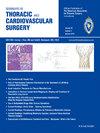当代心脏手术患者术后谵妄的预防与处理。
IF 2.5
3区 医学
Q2 CARDIAC & CARDIOVASCULAR SYSTEMS
Seminars in Thoracic and Cardiovascular Surgery
Pub Date : 2025-05-19
DOI:10.1053/j.semtcvs.2025.04.008
引用次数: 0
摘要
目的:本综述探讨心脏手术患者术后谵妄的预防和处理,谵妄是一种常见的并发症,与显著的死亡率、发病率、住院时间延长和认知能力下降有关。目的是巩固目前关于术后谵妄病理生理、危险因素、诊断方法以及药物和非药物干预的证据。方法:通过PubMed/MEDLINE数据库回顾到2024年10月,确定评估心脏手术与术后谵妄发生之间关系的研究。结果:术后谵妄的发病机制复杂,涉及神经炎症、神经递质失衡和内皮功能障碍,并与基线脆弱性和围手术期应激因素有关。使用重症监护病房(CAM-ICU)混淆评估法和重症监护谵妄筛查清单(ICDSC)等工具进行早期筛查有助于及时发现。预防强调非药物干预,如医院老年生活计划和ABCDEF捆绑计划,以及最小化高风险镇静剂的药物策略。新兴技术,包括术中神经生理监测模式和机器学习模型,增强了术后谵妄风险评估并实现了有针对性的干预。结论:有效的心脏手术术后谵妄管理需要非药物和药物相结合的平衡方法。将循证实践和创新技术整合到常规护理中,有望改善患者的治疗效果。正在进行的研究对优化术后谵妄管理和规范高危人群的做法至关重要。本文章由计算机程序翻译,如有差异,请以英文原文为准。
Contemporary Prevention and Management of Postoperative Delirium in Cardiac Surgery Patients
This review examines the prevention and management of postoperative delirium in cardiac surgery patients, a frequent complication linked with significant mortality, morbidity, prolonged hospitalization, and cognitive decline. The aim was to consolidate current evidence on postoperative delirium pathophysiology, risk factors, diagnostic approaches, and pharmacologic and non-pharmacologic interventions. A PubMed/MEDLINE database review was conducted through October 2024, identifying studies that evaluated the relationship between cardiac surgery and the occurrence of postoperative delirium. The pathogenesis of postoperative delirium is complex, involving neuroinflammation, neurotransmitter imbalance, and endothelial dysfunction, compounded by baseline vulnerabilities and perioperative stressors. Early screening using tools like the Confusion Assessment Method for the Intensive Care Unit (CAM-ICU) and Intensive Care Delirium Screening Checklist (ICDSC) aid in timely detection. Prevention emphasizes non-pharmacologic interventions, such as the Hospital Elder Life Program and the ABCDEF bundle, alongside pharmacologic strategies to minimize high-risk sedatives. Emerging technologies, including intraoperative neurophysiologic monitoring modalities and machine learning models, enhance postoperative delirium risk assessment and enable targeted interventions. Effective postoperative delirium management in cardiac surgery requires a balanced approach incorporating non-pharmacologic and pharmacologic methods. Integration of evidence-based practices and innovative technologies into routine care holds promise for improving patient outcomes. Ongoing research is essential to optimize postoperative delirium management and standardize practices in high-risk populations.
求助全文
通过发布文献求助,成功后即可免费获取论文全文。
去求助
来源期刊

Seminars in Thoracic and Cardiovascular Surgery
Medicine-Pulmonary and Respiratory Medicine
CiteScore
5.80
自引率
0.00%
发文量
324
审稿时长
12 days
期刊介绍:
Seminars in Thoracic and Cardiovascular Surgery is devoted to providing a forum for cardiothoracic surgeons to disseminate and discuss important new information and to gain insight into unresolved areas of question in the specialty. Each issue presents readers with a selection of original peer-reviewed articles accompanied by editorial commentary from specialists in the field. In addition, readers are offered valuable invited articles: State of Views editorials and Current Readings highlighting the latest contributions on central or controversial issues. Another prized feature is expert roundtable discussions in which experts debate critical questions for cardiothoracic treatment and care. Seminars is an invitation-only publication that receives original submissions transferred ONLY from its sister publication, The Journal of Thoracic and Cardiovascular Surgery. As we continue to expand the reach of the Journal, we will explore the possibility of accepting unsolicited manuscripts in the future.
 求助内容:
求助内容: 应助结果提醒方式:
应助结果提醒方式:


